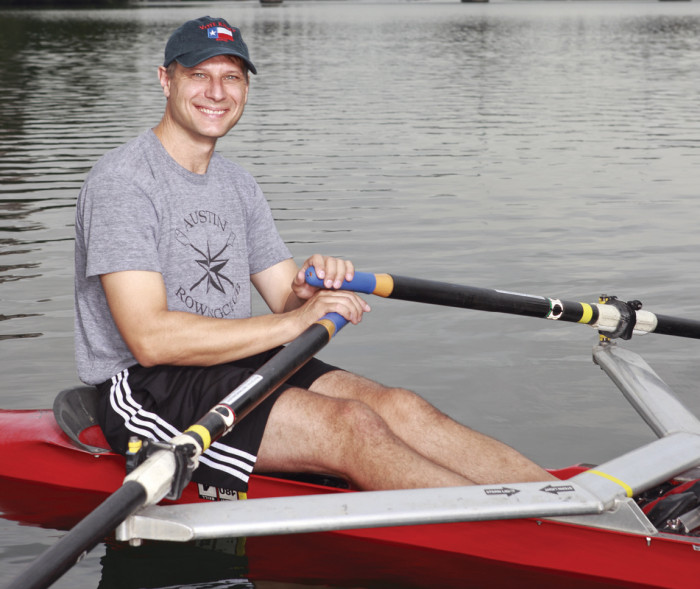Sixteen years ago, Rob Ignatowski, like many Austinites who run around Lady Bird Lake, got in the habit of watching rowers glide by and began wondering what the city looked like from the water.
Many active rowers pick up the sport in college, and have the morning practices and the feel of a boat on their shoulders ingrained. For Ignatowski, an electrical engineer at Freescale Semiconductor, it was simple curiosity that hooked him and led him down a path toward international competition.
He joined one of Austin’s two rowing clubs, Texas Rowing Center, and got involved in sculling – a single, long and thin boat with one rower. But rowing soon became a larger part of his life.
“I started rowing before I came out,” says Ignatowski. “I told a friend, and she said ‘I know this guy named Steve Onken who rows, do you want to talk to him?’….he was very helpful for me, negotiating things and figuring out what was going on.”
At the time he met Ignatowski, Onken was in the process of putting together a rowing squad for the upcoming 1998 Gay Games in Amsterdam, and soon asked Ignatowski about joining the team. Ignatowski moved over to the Austin Rowing Club, where the nascent team of six or seven rowers practiced, and began rowing in a quad, a fast-moving shell with four rowers who scull with two oars.
“It started out with ‘let’s just do a quad’, and it grew into this massive thing of a 50-member squad,” he says.
The team that developed and made the trip to Amsterdam, Row Team Austin, embodied the aspects of rowing that Ignatowski says are so addictive.
“It was just constant,” he says, recalling the nearly two- year training for the games. “The sun would go down and I’d still be here, the sun would come up and I’d still be here.”
Like many athletes who slog through the grueling training sessions and begin to wonder if it’s all worth it, Ignatowski says there were mornings when he just wanted to sleep in instead of facing another early practice. But once you’re in a race with another boat next to you, every second of training instantly becomes worth it, he says. Competition aside, Ignatowski says rowing has been both a way to meet people from all walks of life – he even met his partner of seven years, J, while rowing – and an unparalleled way to relax.
“When you’re out on the water it’s a different perspective…
When you go down to Redbud (Island) and see those cliffs, it’s like you’re not in Austin anymore,” he says. “You can totally focus on what you’re doing and everything else falls away. When you’re on the water you don’t have to worry about traffic, you don’t worry about your surroundings, you don’t have to worry about anything.”
Ignatowski recalls that when Row Team Austin first started training together – many of the boats filled with novices who had never touched an oar before – there were some disheartening losses. But the crews slogged through the learning curve and began to gel.
With the far-off look in his eyes that many veteran rowers get when reliving their victories, Ignatowski says he had some of his best rows with Row Team Austin, and the gay games in Amsterdam gave the team a chance to test itself for the first time against competitors from all over the world.
Ignatowski competed in two very different kinds of boats at the games, an eight and a quad. Eights, so called because there are eight rowers and one coxswain who steers and motivates the crew, are the largest boats in rowing. While in an eight, the rowers “row sweep,” meaning each uses one oar on either the port or starboard side of the boat. A quad is nearly as fast because its four rowers scull, each rower using two oars.
Ignatowski won two medals at the games, a gold in the quad and a silver in the eight. His boat had to fight for the gold, he says, although the battle for first and second came down to his boat and one other – the kind of body-numbing competition, resolved by a matter of inches that rowers forever remember. Although he had only competition in mind while training for the gay games, Ignatowski says he saw a whole other side of the event’s importance once he got there and watched Amsterdam come alive, celebrating the athletes wholeheartedly.
“What really brought it home was when you saw people who were from countries where if there was even an inkling of [being gay], they could be imprisoned or killed…and they could come to a place where they could see people walking down the street kissing and holding hands. Then you understand, and it fills you with pride.”
While Ignatowski and his partner J have both taken a break from rowing recently, he says they will likely come back to it soon.
“You feel so good about yourself, it puts your mind in such a good mental state.”




































